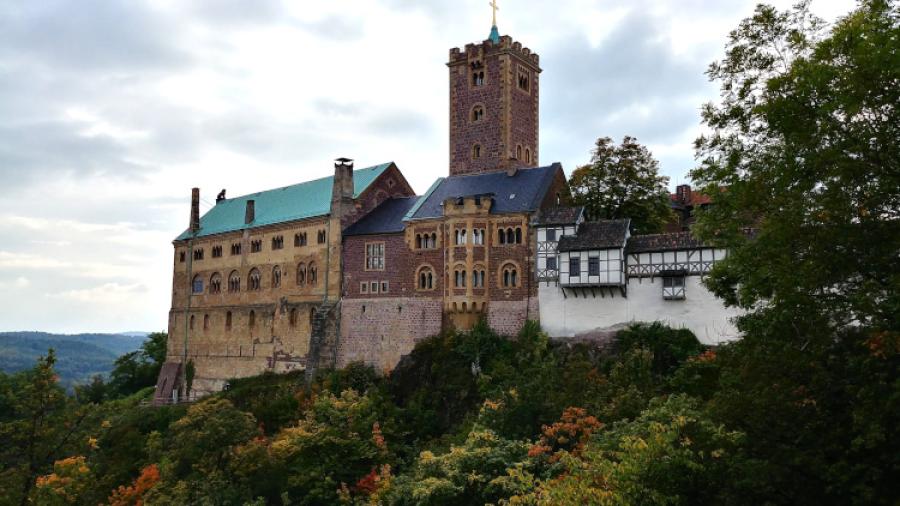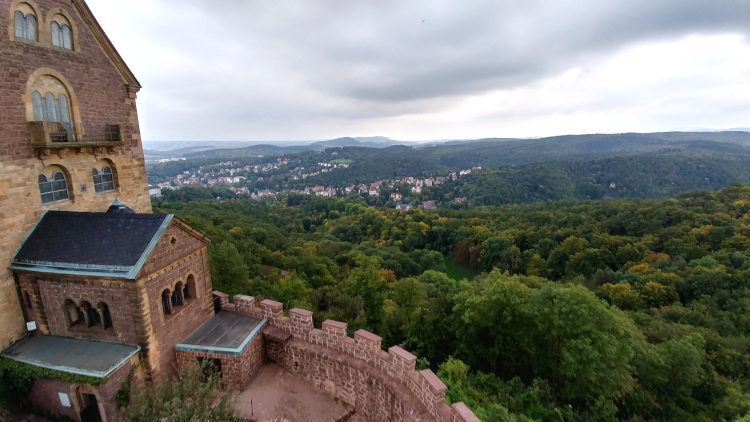The Reformation at 500: Luther’s Escape to the Wartburg
Image

Wartburg Castle
Read the series.
We visited Eisenach and the Wartburg Castle on the Sunday of our 500th anniversary Reformation trip.
The day was gloriously dark and dreary. Fortunately, we felt only a few raindrops. But it was an absolutely perfect day for a ride through the Thuringian Forest.
A young Martin Luther spent several of his most formative years less than three miles from the Wartburg Castle—in Eisenach, where the Cotta family hosted him as a schoolboy preparing to go to the University of Erfurt. We also traced the history of Johann Sebastian Bach that day, and our enthusiastic tour guide—a California transplant—told us excitedly how Eisenach became the source of Western civilization. He seemed to be familiar with every crack in the sidewalk of that city.
The Wartburg Castle is majestically awkward. Consider this fact: It had already been there for nearly 500 years by Luther’s time! The sprawling castle bears evidence of continuous construction, and one can only wonder how many sacrificed their lives in the process of building and maintaining it. The sights from the grounds around the castle, as well as within it, are too magnificent to describe. One can see the majesty of creation looking down from the castle grounds, and the depth of history that this site generates is almost palpable.
Once inside, no photographs were allowed—although the scenes are truly indescribable. Some of them would offer the perfect backdrop for a horror movie. Others just seem to pull you all the way back to the Middle Ages. There are huge meeting rooms and vast hallways, along with tiny spaces that stimulate claustrophobia and circular staircases that induce dizziness.
But one room has been the main focus within this gigantic castle for the last five centuries. It became the lodging where a certain bearded knight—Junker Jörg—slept and worked in complete anonymity for nearly a year in 1521 and 1522.
That long-haired Knight George was, of course, none other than Dr. Martin Luther himself.
Emperor Charles V had consigned him to be a notorious heretic with an edict at the close of the Diet of Worms. He asked for agreement from his electors to solidify that conclusion. Significantly, Charles was rebuffed by Elector Frederick the Wise of Saxony, whose support for Luther was evident.
Luther’s journey from Worms, presumably into exile, began on April 26, 1521, and no one could be punished for killing him. His safe passage applied only as far as his return to Wittenberg.
One must admit that Charles kept his word with this whole arrangement—at least to a greater extent than Sigismund had regarding his understanding with Hus. The fear (or expectation) that Luther would fulfill his role as “The Saxon Hus” proved to be premature.
But, unknown to Luther, Frederick would be taking no chances with his famous professor. He sent a pack of kidnappers to arrest an unsuspecting Luther on May 4. They presumably covered him with a hood—and galloped away to the castle that would become his mighty fortress.
There, hidden in plain sight, working in his humble quarters inside the massive castle, Luther took only 11 weeks to translate the New Testament into German—and create a language that would unify the German people in the process. He also wrote several other volumes before his return to Wittenberg the following March.
I would have to say, after just one visit, that the Wartburg Castle is one of my most favorite places in the world. I wish that I could be there for at least a week, with complete freedom to explore the buildings and grounds. There are few places I have been that are more fascinating or inspirational.
Yet the events that transpired at the Wartburg Castle—beginning 500 years ago this week—transcend even the magnitude of the structure. God hid Martin Luther there, away from the world, for 10 months, providing a place for him to achieve amazing accomplishments.
It was an unplanned escape, but it “actually turned out for the furtherance of the gospel” (Phil. 1:12)—“according to the purpose of Him who works all things according to the counsel of His will” (Eph. 1:11).
The principles of Reformation that had gripped Luther’s own heart and mind would soon begin to transform Western civilization.
Scripture taken from the New King James Version®. Copyright© 1982 by Thomas Nelson. Used by permission. All rights reserved.

Paul Scharf 2019 Bio
Paul J. Scharf (M.A., M.Div., Faith Baptist Theological Seminary) is a church ministries representative for The Friends of Israel Gospel Ministry, serving in the midwest. He also assists Whitcomb Ministries and writes for “Answers” Magazine and Regular Baptist Press. For more information on his ministry, visit foi.org/scharf or email [email protected].
- 340 views


Discussion